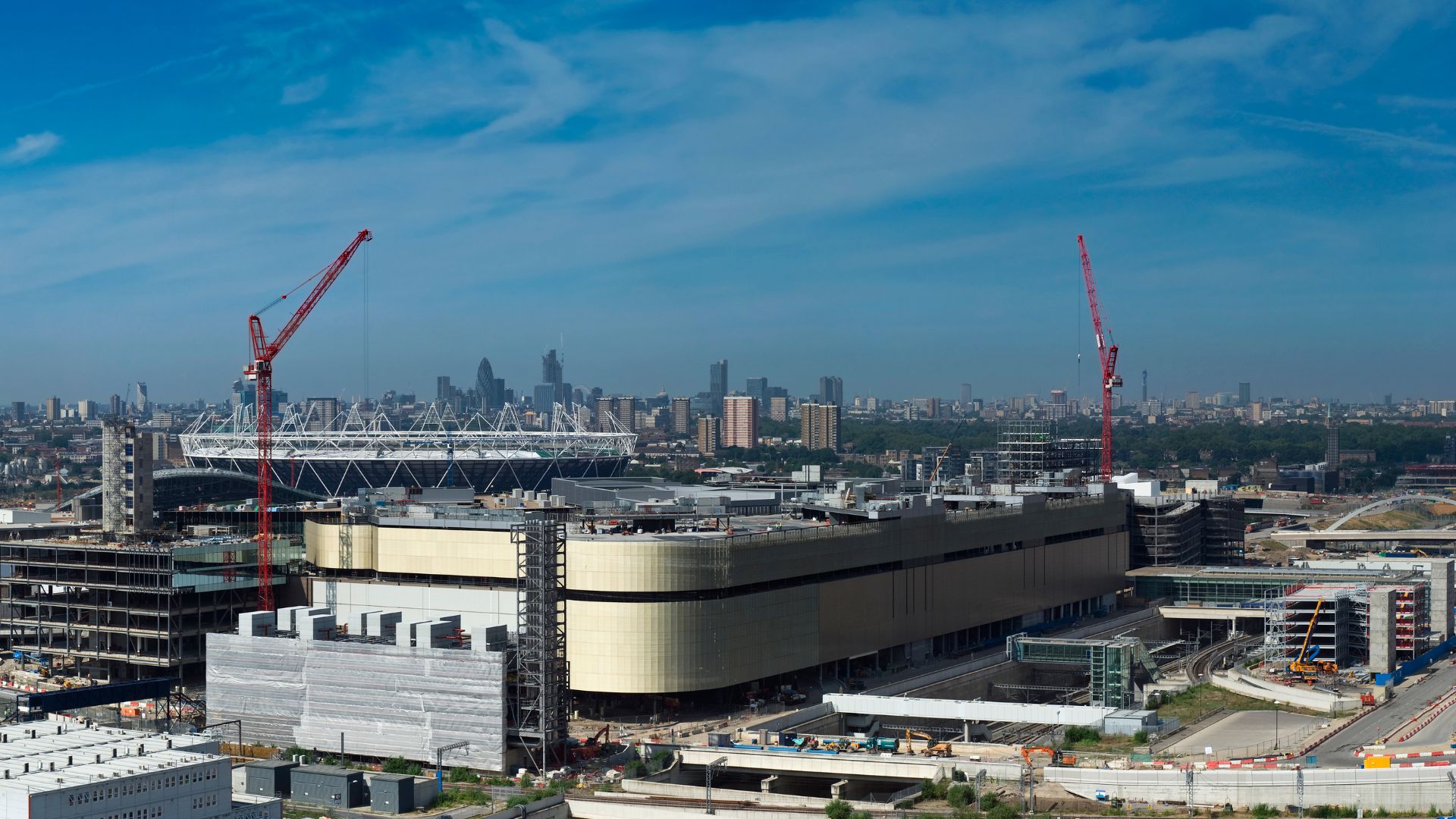How Can Town Planners Navigate Complex Regeneration Projects?
03 Apr, 20241-2 minutes
In this blog, you will learn:
- Why regeneration projects are important.
- What involvement Town Planners have in regeneration projects.
- Why regeneration projects can be complex.
- How Town Planners can navigate complex regeneration projects.
- Where the latest Town Planner jobs are and how to apply for them.
By addressing social, economic and environmental challenges, regeneration projects have the ability to create vibrant, inclusive and sustainable communities that will enhance the quality of life for those living and working there.
However, with encompassing urban renewal, community development, economic growth and environmental sustainability, regeneration projects can become complex.
In our latest blog, we’re exploring how Town Planners can navigate the complexities of regeneration projects, in order to work efficiently and optimise project success.
Why are regeneration projects important?
Regeneration projects of any scale are an essential part of using investment and the creation of new jobs and housing to promote social, environmental, cultural and economic advancements within local communities.
As a result of these changes, regeneration projects have the ability to improve the usability and accessibility in the areas of which they are regenerating.
The diversification of local economies is another factor that makes regeneration projects so important and their ability to bring about positive changes for the people who live and work within that community.
What involvement do Town Planners have in regeneration projects?
Town Planners play a central role in regeneration projects and are required to contribute their scope of expertise across urban planning, project management and community engagement.
Amongst their responsibilities, Town Planners are required to conduct comprehensive assessments of existing site conditions and develop policies and plans. These policies and plans will guide regeneration and ensure that it aligns with community needs and sustainable practices.
According to the Royal Town Planning Institutes State of the Profession 2023 report, as of 2023 there were 22,000 planning professionals working in the UK, indicating the high capacity of projects taking place.
Why can regeneration projects be complex?
There are a number of factors that can make a regeneration project complex to navigate, including:
- Legal and regulatory complexities.
- Historical considerations.
- Financial implications.
- Community engagement considerations.
- Risk management.
- Political and social dynamics.
Legal and regulatory complexities
In order to govern land use, the United Kingdom operates a complex legal and regulatory framework. As well as governing land use, this framework also oversees planning permissions, building codes and heritage protection.
Often, permits must also be obtained in order to carry out necessary work which can cause complexities within regeneration.
Compliance with statutory requirements is also required but this can be time consuming, resource-intensive and require specialised knowledge of planning law and regulations.
On October 26th 2023, the Levelling-up and Regeneration Bill came into force. The aim of this bill has been to speed up the planning system, encourage councils to create plans to build more homes and hold developers to account.
The act requires local planning authorities to have a design code in place covering their entire area and the introduction of a ‘street votes’ system permits residents to hold a vote on whether planning permission should be given for development on their street.
The changes imposed by the act have played a significant part in the operations of the planning system and how complex regeneration projects can be.
Historical considerations
Generally, regeneration projects within the UK involve redeveloping brownfield sites.
Such areas are defined as previously developed land that no longer has a use or locations with a history of industrial use, contamination or neglect.
The legacy issues which accompany brownfield sites, such as infrastructure deficiencies and environmental remediation, can result in complexities within the regeneration process.
Buildings and sites with historical significance can also be subject to planning restrictions or conservation area designations, which puts limits on how much they can be developed or modified.
For example, the iconic London landmark, Battersea Power Station, ceased operation in the 1980’s and has remained vacant for many years. Its distinctive history prompted the proposal of various redevelopment ideas, however the site's historical significance and architectural value created numerous challenges for regeneration, such as planning constraints.
The power station has now been transformed into offices, shops and restaurants, but not without challenges, caused by historical considerations, along the way.
Financial implications
To ensure the success of a regeneration project, careful financial planning must be carried out. Securing funding sources, managing budgets and balancing financial viability with environmental goals and objectives is essential for the positive outcome of a regeneration project.
However, financial implications and setbacks can hinder the time scale of a regeneration project and create complexities within planning and execution.
Cuts in public sector funding, sometimes driven by a shift in government priorities, can significantly impede regeneration efforts. Fluctuations within property market dynamics, such as movement in property values or changes in demand, can also impact the financial viability of a regeneration project, in turn making the process more complex for Town Planners.
Community engagement considerations
Community engagement is an essential factor for the success of regeneration projects. The effects of a regeneration project can change the physical and economic characteristics of a local community and therefore obtaining and considering community feedback is important. Feedback can be obtained through various methods such as focus groups, surveys, questionnaires or social media.
Without listening to feedback, those involved in regeneration projects are in danger of disrupting the social and emotional connections people have with their local environment and resistance from local residents can make the regeneration process more complex.
Risk management
There are a number of risks associated with a regeneration project that can make the process more complex.
Identifying, assessing, navigating and mitigating risks can be tricky and time consuming, however this practice is essential to ensure project success.
On larger scale projects, risk management might involve extensive planning for every risk that could occur, to ensure that solutions are in place, should any challenges arise.
For example, delays in construction activities can cause a significant risk to the timeline of a project and its ability to stay on budget. Inclement weather and material shortages can affect construction efforts and whilst Town Planners cannot control the weather, they might be able to put measures in place to mitigate the risks associated with material shortages.
Political and social dynamics
Political and social dynamics can make navigating regeneration projects more complex. Often, projects intersect with political agendas and shifts in political landscapes, changes in leadership and competing interests within different levels of government, can all affect the trajectory of a regeneration project.
For example, historically, the EU has played a significant role in funding UK regeneration projects, particularly in areas that qualify for regional development assistance. However, since Brexit, the future availability of this funding has been called into question, along with whether the UK government will provide an equal level of support for regeneration projects.
As well as an impact on funding, Brexit has led to increased market volatility with fluctuations in property prices and interest rates both affecting project costs and the confidence investors have in regeneration initiatives.
Political and social implications mean regeneration professionals must be able to adapt their project planning and implementation, to mitigate complexities and make the process as smooth as possible.
How can Town Planners navigate complex regeneration projects?
In order for Town Planners to successfully navigate complex regeneration projects, there are various factors involved. Best practice is to take the following steps:
- Utilise technology.
- Collaborate with experts.
- Develop a strategy.
- Keep up to date with legal requirements.
- Conduct due diligence.
- Implement sustainable practices.
Utilise technology
Technology is a useful tool to help Town Planners make informed decisions and optimise the results of their projects.
In order to navigate complex regeneration projects, Town Planners may opt to use Geographic Information Systems (GIS) for site analysis, project management software to track their progress and manage their resources and predictive modelling for market forecasting.
Joel Khambay says “GIS is a great tool for Town Planners because it gives them enhanced visibility into the data they’re working with. They can monitor any changes in data over time and predict any effects which projects might have on the environment.”
Collaborate with experts
In order to address complex challenges, such as financial implications and regulatory complexities, and to ensure that a regeneration project is executed successfully, Town Planners are advised to collaborate with others in the profession.
By sharing ideas, expertise and solutions, Town Planners are able to navigate challenges that arise during a regeneration project.
Architects, Engineers, Legal Advisors and Sustainability Consultants are all brilliant sources of knowledge and through collaboration, are able to mitigate the complexities associated with regeneration.
Develop a strategy
By defining clear objectives and developing a strategic vision for regeneration projects, Town Planners stand a better chance of overcoming and mitigating the complexities associated with their work.
Best practice for Town Planners is to define the desired outcomes for the project, set a timeline to complete various stages of the project, budget strategically and carry out all essential risk assessments.
For example, it is good practice for a Town Planner to consider their funding sources when budgeting strategically. Public investment may be a source of funding along with investment from institutions such as Transport for London, which is a local government body responsible for the transportation system in Greater London.
It is also good practice for a Town Planner to set key performance indicators within the project's strategy, in order to effectively track progress and ensure that the project remains on track.
By taking the time and effort to develop a strategy and participate in the above steps, Town Planners are able to guide their decision making and navigate any complexities that arise.
Keep up to date with legal requirements
It’s essential that Town Planners have a solid understanding of legal requirements and the regulatory environment of property management and regeneration.
Overseeing planning regulations, environmental law, building codes and other relevant legislation is an important part of navigating the complexities of regeneration projects.
A thorough comprehension of property and land law is essential, as property law issues, including land ownership, leases and property rights, must be considered to ensure that legal requirements are adhered to.
Town Planners are advised to keep up to date with legal requirements associated with the sector as a lapse in knowledge could result in legal consequences and the regeneration project becoming a lot more complex than it needs to be.
Conduct due diligence
Due diligence refers to taking reasonable steps in order to avoid committing a tort or offence.
Conducting comprehensive due diligence is essential when working on a regeneration project.
Before embarking on a regeneration project, Town Planners are advised to carry out a comprehensive risk assessment, conduct site surveys, analyse market trends, assess the condition of existing structures and look into the preferences of the local community.
By carrying out extensive due diligence, Town Planners are able to mitigate the risks and complexities associated with regeneration projects.
Implement sustainable practices
Sustainability and the environmental impact of regeneration has been a hot topic for some time now and Town Planners are encouraged to embrace sustainable development principles. A successful urban renewal project should have sustainability at its core.
Joel Khambay says “It’s really important for Town Planners to prioritise their social responsibility. If they don’t, they’re at risk of causing upset amongst local communities and this will make the regeneration project a lot more complicated.”
Joel continues “Incorporating green building practices and renewable energy sources are effective ways to enhance a regeneration project’s long term sustainability and limit its negative effects on the environment.”
Town Planner jobs
Searching for your next interim Town Planner job? We work with local authorities and private sector organisations nationwide so why not check out the latest jobs or upload your CV to be notified when a suitable position becomes available.
Recruit Town Planners
If you’re struggling to recruit Town Planners, why not reach out to our Senior Consultant, Joel Khambay on 01772 954200 to discover the recruitment services available.
Who is Spencer Clarke Group?
We are an energetic recruitment agency with a passion for transforming the recruitment experience. From the way we conduct business, to the culture in our office in the North West, we believe in having a positive influence and creating meaningful change.
We operate in two sectors:
In eleven specialisms:
Healthcare, Social Care & Nursing
Corporate Functions & Business Support




